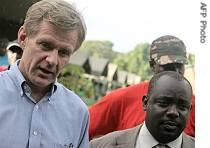2006年VOA标准英语-UN's Egeland Says Darfur Violence a 'Powder Keg(在线收听)
By Noel King
Khartoum
18 November 2006
United Nations Humanitarian chief, Jan Egeland, has painted a grim picture of life for millions of civilians in Darfur, following his return from the war-torn region. On Saturday, Egeland appealed to the Sudanese government, armed militias and rebel groups to cease fighting.
-----
 UN Emergency Coordinator Jan Egeland (L) with Martin Ojul, chairman of LRA negotiating team, in Sudanese town of Juba |
||
The U.N. envoy cut short his trip to Darfur after being told by Sudanese officials that he would be unable to travel to four of six locations on his itinerary, due to insecurity.
Egeland's delegation was confined to the main cities of Geneina and El Fasher.
"I met in Geneina, yesterday, women who were pleading for security, who said, 'we are abused, we are raped, we are attacked and nobody seems to want to protect us.' We are now playing with a powder keg," he noted. "It could get infinitely worse for everybody unless everybody pulls back."
Egeland called on the Sudanese government to cease restricting the movement of aid workers, in particular, US citizens who have been prevented from traveling to Darfur and southern Sudan.
Observers have charged Sudan with limiting the movement of aid workers in order to hide the severity of the Darfur conflict.
Sudan insists the level of violence has been exaggerated by Western nations.
"I have one appeal to the government of Sudan. Help us help your people. A lot is at stake," added Egeland. "The international community has come here because there is a calling from defenseless civilians in need to help. We frankly feel that there is not an effort to help us help them."
Egeland said he was optimistic about Thursday's high-level talks in Addis Ababa in which Sudanese representatives told delegates from the U.N. Security Council and African Union that they would agree in principle to a U.N. presence in Darfur.
But Sudan has sent out mixed signals in recent days.
Some officials have expressed support for U.N. troops in the region, while others say Sudan will accept only financial and logistical aid from the U.N.
For months, Sudan has staunchly resisted the call for U.N. entry into the region, likening a U.N. mission to colonization.
The African Union force currently monitoring Darfur has suffered from a lack of funding and a weak mandate that critics charge does not allow it to protect civilians.
The AU has only about 7,000 troops in all of Darfur, a region the size of France.
The Darfur conflict has taken tens of thousands of lives and led to the displacement of more than two million people.
Sudan is charged with arming nomadic Arab tribes to crush a 2003 rebellion by African farmers.
Rather than fighting the rebels, militias known as Janjaweed concentrated their attacks on civilians.
A May 2006 peace agreement between the government of Sudan and one rebel group has only ignited more violence, as the Sudanese Armed Forces battle holdout rebel factions in Darfur.